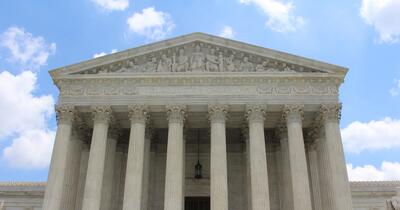
Supreme Court's Latest Term Evidence That we Need Court Expansion
The Court and Congress should be accountable to the people, not corporations.

In the U.S., we are all too familiar with the ways our Congress—more beholden to the corporate interests that bankroll its members’ campaigns than to the people who elect them—fails over and over again to make policy in the interest of the people. For example, in 2021 Congress failed to pass President Biden’s widely popular Build Back Better pandemic recovery plan, after corporations worked overtime to defeat the legislation. While the latest iteration of the bill includes important investments in climate and energy programs over the next 10 years, it also gives significant concessions to the fossil fuel industry – something that should come as no surprise given that the lead negotiator received more in political donations from the oil and gas industry than any other senator (not to mention the fact that he quite literally owns a coal business). Earlier this year, Congress again failed to pass 2 extremely popular pieces of legislation that would protect the fundamental right to vote and shore up our crumbling democracy—the Freedom to Vote Act and the John R. Lewis Voting Rights Advancement Act. Today, tech companies are fighting tooth and nail against commonsense antitrust legislation, and congressional dysfunction means bills to address the most pressing issues of our moment—protecting the constitutional right to abortion and addressing the existential threat of climate change, to name just a few—languish in the Senate.
Today, Congress’ growing inability to make policy, coupled with a multi-decade effort to install justices who will answer to them instead of to us, the people, the Supreme Court has taken on outsized power in our government.
Perhaps less clear are the myriad ways another institution in our federal government is rolling back our rights and dimming the prospects for a just, equitable future. That institution is the Supreme Court. Today, Congress’ growing inability to make policy, coupled with a multi-decade effort to install justices who will answer to corporate and special interests instead of to us, the people, the Supreme Court has taken on outsized power in our government. And it is wielding that power to roll back hard-fought victories on racial, economic, and social justice, and even to proactively take aim at the very heart of our democracy.
In just two weeks, at the end of its term, our nation’s highest court overturned the constitutional right to abortion, expanded gun rights, allowed prayer in public schools and public money for parochial schools (in direct opposition to the supposedly sacred separation of church and state), restricted the Environmental Protection Agency’s ability to limit carbon emissions, and encroached on Native American tribal sovereignty. These decisions are directly contrary to the interests, needs, and priorities of most people in our country.
The current radical conservative supermajority handing down these devastating decisions reflects the interests of the unprincipled partisans who installed it and their corporate sponsors—not those of the multiracial, working- and middle-class majority that makes up this country. For example, the Court overturned the constitutional right to abortion, even though 85 percent of American voters believe pregnant people should be able to access an abortion at least in some cases. Support for gun control is at its highest in a decade, but the Court struck down a New York law restricting concealed carry for handguns (just weeks after devastating mass shootings in Uvalde, Buffalo, Highland Park, and elsewhere). Similarly, a full three-quarters of Americans support action to address climate change, yet the Court restricted the EPA’s power to curb carbon emissions.
We need decision-makers across our government who reflect the people—ideologically and demographically—and who are accountable to us.
We need decision-makers across our government who reflect the people—ideologically and demographically—and who are accountable to us. We need a government that protects our basic civil and human rights. The Supreme Court is no exception. One critical step toward greater representativeness and accountability from the Court is expanding its membership by 4 seats. Adding 4 new associate justices to the Supreme Court would inoculate against the extraordinary partisan packing that has taken place over the last several years and, in turn, defend our democracy and the civil and human rights of all Americans, especially Black and brown Americans.
Court expansion is just one step in the larger project of ensuring that our democracy works for the many, not the few. But it is a vital one, especially since Supreme Court decisions don’t stop with the specific issues dealt with in any given case. Instead, they have wide-ranging impacts in every corner of our lives.
Take Dobbs v. Jackson Women’s Health Organization, as just one example. Beyond putting life-saving reproductive health care out of reach, the loss of bodily autonomy resulting from this case also translates to a loss of economic power, especially for low-income, Black, Latinx, and Indigenous people. Black women experience a maternal mortality rate nearly 3 times as high as their white counterparts and are more likely to live in “contraception deserts.” Women who are denied an abortion experience a significant increase in financial distress that is sustained for multiple years. However, because of long-standing inequities along the lines of race and ethnicity in our economic and healthcare systems—from disparities in poverty rates to healthcare coverage gaps to racial wealth and wage gaps as well as occupational and residential segregation—women and nonbinary people of color stand to face the steepest increase in economic insecurity as a result of this decision. Whether considering the health or the economic impacts of Dobbs, Black and brown people will disproportionately suffer the consequences of the ruling.
Further, the Court’s assault on racial and economic justice of the last few weeks—coupled with that of the last several terms—is just the beginning.
Further, the Court’s assault on racial and economic justice of the last few weeks—coupled with that of the last several terms—is just the beginning. It has already agreed to hear Moore v. Harper next term, a North Carolina case testing the “independent state legislature” theory, a fringe and constitutionally-unsound concept that could upend elections as we know them. And it will hear other critical cases related to the rights of same-sex couples, affirmative action, and fair representation for Black and brown voters.
Opponents of expanding the Court say it would politicize the institution, discard years of precedent, and erode public trust. Yet with the current conservative supermajority, installed by hyper-partisans through 3 highly rushed and irregular confirmation hearings, the Court has already been deeply politicized, precedent has already been discarded, and, according to a June 2022 Gallup poll, trust in the Court is at an all-time low. Two-thirds of Americans also support term limits or a mandatory retirement age for justices. Public opinion is on the side of court reform, and it’s time for elected officials to act on it.
Liberation for Black and brown people in the country requires fighting back against concentrated power across all levels of our society. The people can and should have more control over the institutions and economic forces that shape our lives. Adding 4 more justices, who better represent the demographic and ideological makeup of our country—and who are committed to protecting our civil and human rights—is a critical step toward a Supreme Court that is more accountable to the people and, in turn, a more just, equitable future.




